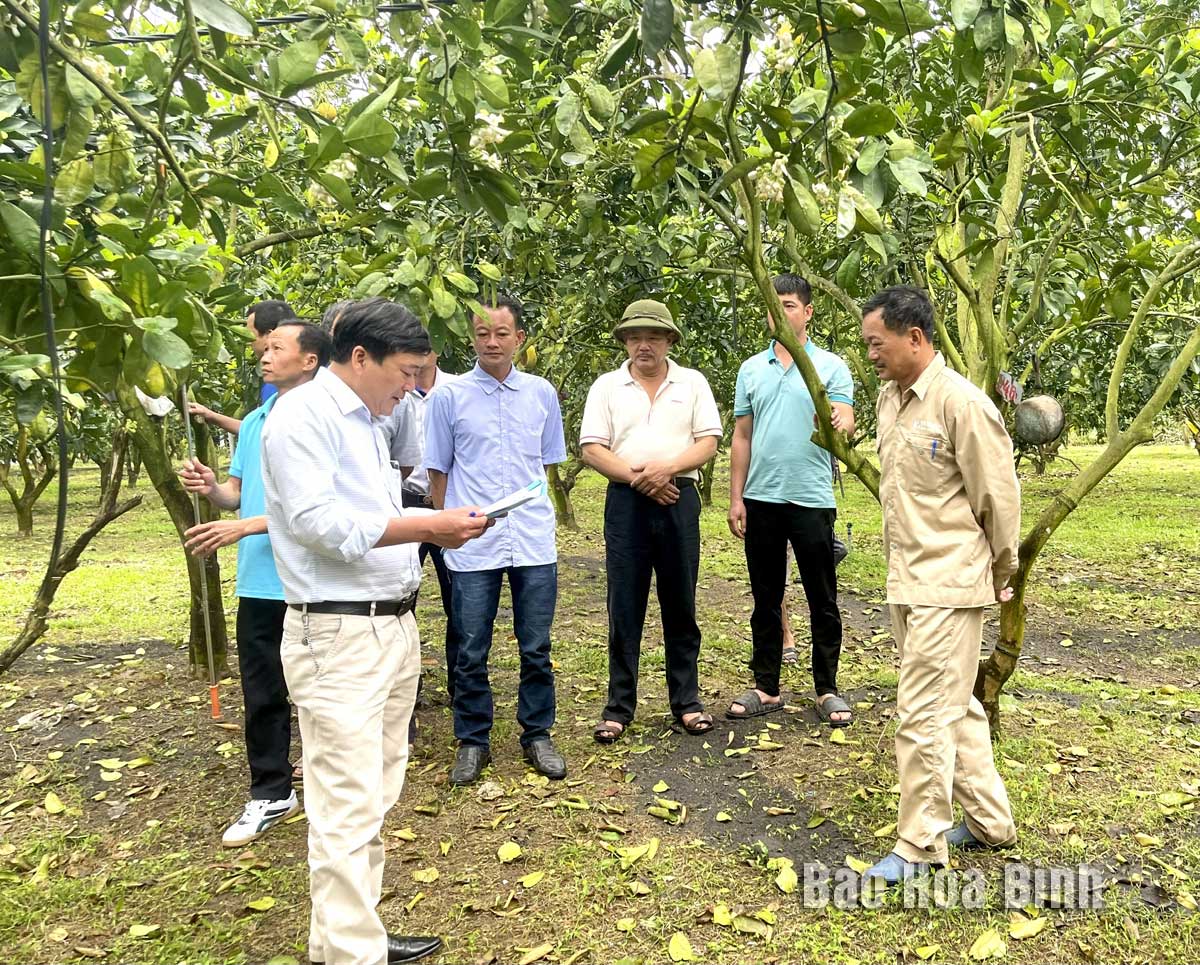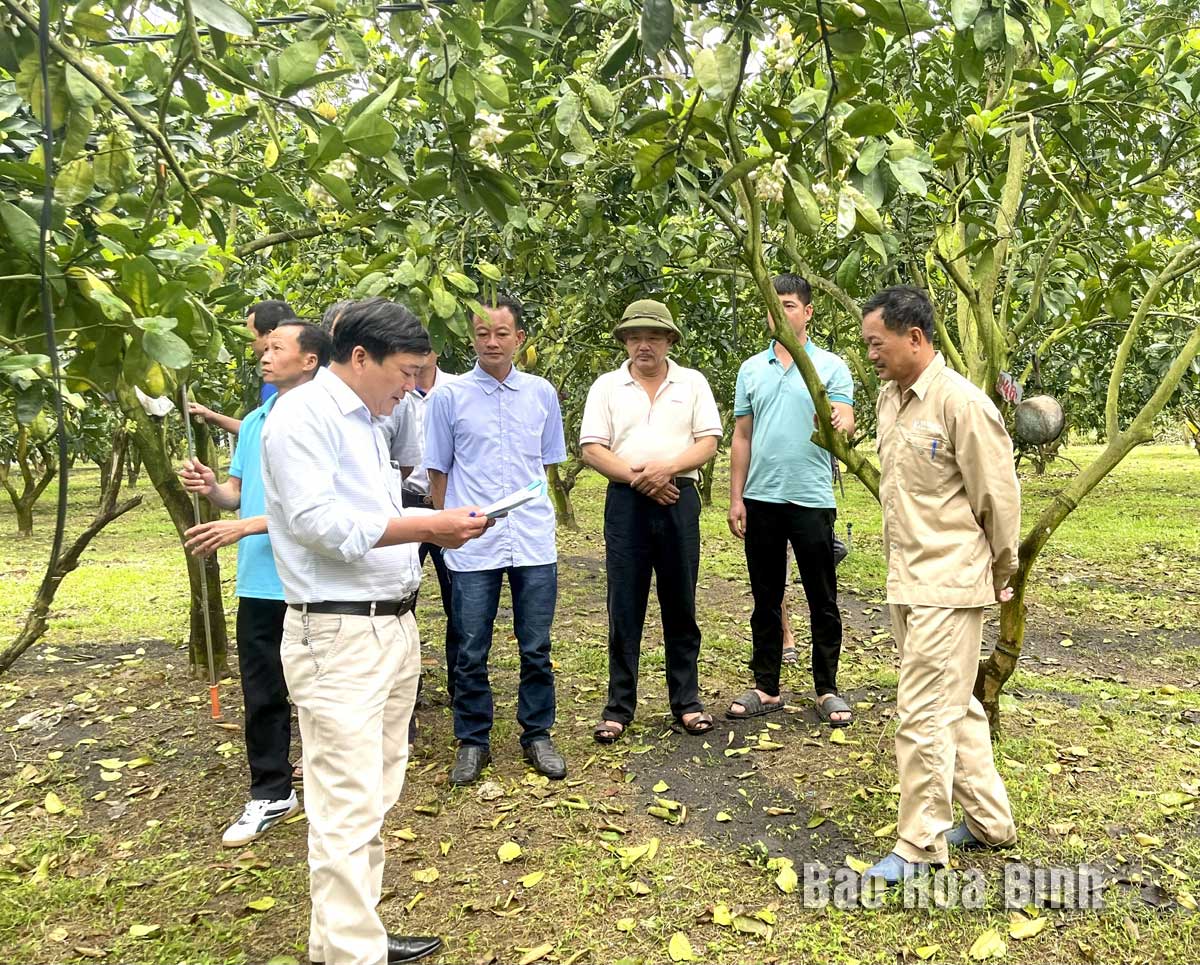
Representatives from Hoa Binh province’s Sub-Department of Cultivation and Plant Protection on February 22 held a working session with the Bureau of Agriculture and Rural Development of Yen Thuy district, and Dai Dong Agricultural Cooperative in Ngoc Luong commune.
Representatives from the provincial Sub-Department of Cultivation and Plant Protection make a field trip to a pomelo orchard of Dai Dong Agricultural Cooperative, and inspect its compliance with regulations regarding growing area codes.
In 2022, 52 farms joined the province’s pomelo production - export chain with 98.25 hectares and five growing area codes granted. Last year, the number of participating farms rose to 201, along with 11 cooperatives and collaborative groups, with 269.08 hectares and 24 growing area codes approved. Seven production facilities have received the GlobalGAP certificate so far, covering 145.5 hectares.
The provincial agricultural sector strives to raise the output of pomelo eligible for export to at least 300 tonnes for the 2024-2025 crop, and maintain the coded growing areas and seek at least two other codes. Besides, at least one packaging facility is expected to be eligible to enter the EU market.
At the meeting with the district Bureau of Agriculture and Rural Development and Dai Dong Agricultural Cooperative, the delegation pointed to achievements as well as obstacles to production, business, market connectivity and product promotion.
They also touched upon production and business plans in the years to come, and how to raise product values, meeting stringent standards, thus ensuring sustainable agricultural export.
According to data from the Hoa Binh Provincial Party Committee, the industrial production index for the first six months of 2025 is estimated to have increased by 20% compared to the same period last year. This marks the highest year-on-year growth rate for this period since 2020.
In the first six months of 2025, Hoa Binh province’s export turnover was estimated at 1.145 billion USD, marking an 18.11% increase compared to the same period in 2024. Import turnover was estimated at $ 804 million, a 17.15% increase, which helped the province maintain a positive trade balance.
The lives of the ethnic minority farmers in Tan Lac district have gradually improved thanks to the new directions in agricultural production. This is a testament to the collective strength fostered through the professional associations and groups implemented by various levels of the district’s Farmers’ Union.
With the motto the "product quality comes first,” after nearly one year of establishment and operation, Muong village’s Clean Food Agricultural and Commercial Cooperative, located in Cau Hamlet, Hung Son Commune (Kim Boi district), has launched reputable, high-quality agricultural products to the market that are well-received by consumers. The products such as Muong village’s pork sausage, salt-cured chicken, and salt-cured pork hocks have gradually carved out a place in the market and they are on the path to obtaining the OCOP certification.
In the past, the phrase "bumper harvest, rock-bottom prices" was a familiar refrain for Vietnamese farmers engaged in fragmented, small-scale agriculture. But today, a new spirit is emerging across rural areas of Hoa Binh province - one of collaboration, organisation, and collective economic models that provide a stable foundation for production.
Maintaining growing area codes and packing facility codes in accordance with regulations is a mandatory requirement for agricultural products to be eligible for export. Recently, the Department of Agriculture and Environment of Hoa Binh province has intensified technical supervision of designated farming areas and packing facilities to safeguard the "green passport" that enables its products to access international markets.



